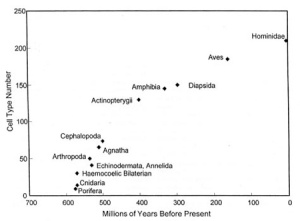Thanks to spectacular advances in astronomy it has become more and more clear how ubiquitous planets and how abundant habitable (Goldilocks) planets are. With many planets now determined, extrapolations can be made to estimate the total amount of planets in our galaxy and these estimates range anywhere from ~100 million to 50 billion of total number of planets and from several million to 1 billion Earth-like planets.. basically, a lot.
This ubiquity lends fresh weight to the question first raised by Enrico Fermi and Micheal Hart: if life is so common and the existence of extraterrestrial civilizations so likely, where is everybody? Many hypothetical solutions to this paradox have been proposed, from a tendency of complex life to self-destruct to simply an extreme rarity of planet Earth (a full list is found here). I would like to propose a new explanation, namely, if life is found elsewhere, it will be maximally exactly as complex as we are and thus has only just recently began looking beyond their home planet. This seems an unlikely solution, but if the constrains specified below hold true, this is a genuine possibility.
First, I want to look at man’s position among other life here on Earth.
Before Darwin and the scientific method, man was seen as the center of creation; God’s chosen one, created in his image, other plants and animals were mere props in mankind’s play. Nowadays, mankind is viewed as merely one integral piece of the ecological machinery, slightly brighter perhaps, severely influential probably, but well within the Gaussian distribution of faunal attributes, in other words, nothing special.
I would like to rehabilitate our role as center of creation of sorts, since in a very fundamental way we really are the pinnacle of the animal kingdom and so does our evolution differ fundamentally from that of other beings. Namely, in terms of complexity, it is quite possible that the human brain is the most complex object in the known universe. Although complexity is a mere conceptual concept and not quantifiable, the following facts lend credit to why this claim has so often been made: The human brain has around 100 billion nerve cells or neurons, more than the number of stars in the Milky Way. Between them they have about a 100 trillion nerve connections. If each neuron of a single human brain were laid end to end they could be wrapped around the Earth twice over.
It is this brain that has enabled us to dominate as a species, rising above nature’s inter- and intraspecies continuous squabble over limited resources onto a new playing field where we stand uncontested by other species. It is our complexity itself which enables us to evolve differently from other species, quite possibly our technology will continue man’s lead into ever more complex ‘beings’. Quite unlikely that we will ever be surpassed in complexity by any other being (no Planet of the Apes seems likely).
Richard Dawkins wrote an interesting book on our ancestors, in as many chapters he traces 40 steps of evolutionary ancestors branching off. All steps seem to be an increase in complexity. (Look at the splendid http://www.onezoom.org/ for an extensive depiction of the tree of life.) In many steps these newly complex beings seem to have evolved into new playing fields, fresh niches, which were previously unexploited, e.g. when the first land animal evolved, or the first animal came to be that used oxygen, or the first mammal arose, whose warm-bloodedness and hair enabled it to live on a wider range of latitudes and its milk production enabled their offspring to develop more sophisticated brains.

The number of different cell types seem to be rising with time, suggesting an increase in complexity
Evolution is viewed as the natural selection of favorable traits, which depending on evolutionary pressure, might be to become larger or smaller, darker or lighter, faster or slower or more complex or simpler. But, what if for the most complex being, this leads to novel evolutionary possibilities, expanding there enables the most complex being to advance its lead, to build upon its winning complexity and accelerate it. Such a being would adhere to the Law of Accelerating returns (as per Ray Kurzweil).
What’s more, such a being and all his ancestors would in any time in history have been the most complex being. This being is us.
After each breakthrough to a new playing field, a fan of newly evolved beings compete, interact and interbreed, before establishing one or more optima, e.g. with all species of Homo with which Homo Sapiens competed, or the Cambrian explosion, when first multi-cellular enabled much more complexity, or perhaps the existence of viruses, which according to one theory co-evolved with RNA.
The following schematic overview I have created illustrating this concept. Mankind’s path towards higher complexity is straight (on a log scale), others more random, like that of the horse with which we share a common ancestor a little over a hundred million years ago, or like that of Neanderthal man which branched of about 400,000 years ago and went extinct roughly 30,000 years ago at which time they displayed some cultural traits.

Schematic depiction of complexity growth of man’s evolution and that of some additional entities conceptually.
I have contemplated if there might be a rate with which this exponential rise in complexity might occur, something I describe in this blog post. I do think this progress is robust, as robust as Moore’s law and events considered catastrophic such as the meteor that ‘wiped out’ the dinosaurs, other mass extinctions, the two World Wars and perhaps even the forming of planet Earth (meaning the exact time of it) were from the perspective of the evolution of complexity, in effect non-events.
Many facts of contemporary civilization point to such robustness, e.g. the fact that many technological advances were developed separately and independently such as in agriculture, in pyramid building (for an elaborate examination of this look at Kevin Kelly’s What Technology Wants), but also in the domestication of dogs and horses. These facts have been so wondrous to many, that they have been incorporated in elaborate conspiracy theories e.g. of alien ancestry, whilst this is solely an expression of the robustness with which mankind has been progressing.
In the universe the arrow of complexity is aligned with the arrow of time.
If complexity growth is both unperturbed by random events and governed by some universal constant, as I believe it is, we can then take this to its ultimate conclusion and provide for an alternative for Fermi’s paradox.
We can use the concept of Uniformitarianism which is the scientific observation that the same natural laws and processes that operate now have always been operational in the past and apply everywhere in the universe. So if the evolution of complexity was robust and continuously towards ever more complexity and is governed even by a certain constant, here, on planet Earth, it is logical to assume that this applies elsewhere in our galaxy as well. And that if our personal history started with the Big Bang followed by the creation of protons and neutrons and the creation of heavy elements, this would be a shared history in other places of the galaxy, and that if the formation of life followed logically from this, it would’ve followed logically from this elsewhere where a Goldilocks planet was available as well. Similarly, if life became more complex here continuously, uninfluenced by random events, like mass extinctions, it would do so elsewhere in the galaxy as well.
Into the future our path would be as follows, just like in the past more complex parts interlink to form ever more complexity, now, we are at the onset of the interlinking of the human brain with technology, the rising computing power and the internet are the first glimpse of this. Elsewhere in our Galaxy, other civilizations are doing the same. Ultimately, man will link with other civilizations in order to create even more complex entities, these complexities might even rival the Universe’s natural tendency to increase its entropy indefinitely.


